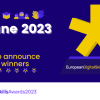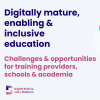Open the Box - Italy
Open the Box kicked-off in 2020 in the midst of the COVID-19 pandemic with the goal to build a scalable and effective media literacy project, targeting teachers and educators to enhance the digital skills of students between 11 to 18, with some beta tests in Europe too. Thanks to a 3-year grant by a private foundation, they have designed a cascaded media literacy program, addressing more than 4.000 teachers and educators, that, in turn, reach more than 25.000 students in schools and extra-curriculum activities.
The program’s pillars
Training and capacity building
Teachers can choose between 11 learning pathways on topics such as source-checking, visual culture, conspiracy thinking, data literacy, AI and synthetic media. For each pathway teachers are asked to invest just 6 hours of their schedule, for following a self-paced online course (3 hours), completing a live workshop (2 hours) and receive a 1-hour personalised mentorship session. During the learning pathway they don’t just learn how to pick a good source or how to use ChatGPT for an assignment, but also how to design and run a media literacy workshop in their own classroom. So far they have trained around 2.000 teachers and educators, measuring their skills before and after the training. The results are highly positive, with teachers improving their digital skills in a consistent way.
Educational kit
Open the Box designed an educational kit with the final goal to make teachers able to run a workshop autonomously, while making their students more engaged. For this reason they have validated a methodology based on a sequence of fixed activities:
- Students’ engagement (live mini-game)
- Analysis (presentation)
- Collaboration (group activity)
- Evaluation (self-paced quiz)
The interactive resources are very flexible and cross-topic: they can be used for any subject and any grade by students between the ages of 11 and 18, both in presence or online. So far, more than 500 workshops have been organised in the Italian schools, reaching more than 20.000 students.
Challenges
After running a workshop, both teachers and students are invited to participate in online challenges on fact-checking, data visualisation and meme generation. So far, teachers and students have uncovered cases of fake Pablo Neruda quotes or made-up stories about weird animals, as well as participating in intensive meme generation or data-physicalization assignments (data-physicalization is a new that helps people explore, understand, and communicate data using computer-supported physical data representations).
Through these challenges, students and teachers understand that they are part of a bigger ecosystem.
Why is this a good practice?
Before launching the program, Open the box have worked a lot on the design of the educational format itself. They didn’t want to replicate one of the many projects offering one-time workshops in schools or “flooding” teachers with guides and do-it-yourself lesson plans. Instead of reinventing the wheel, their goal was centred around achieving a long-lasting impact within the educational ecosystem, and building alliances with partners to act as multipliers, spreading the word of the initiative's action further.
The approach behind Open the box is grounded in sustainability - after the 3-year pilot phase in secondary schools, the initiative plans to: expand to reach out also to primary schools teachers and educators; partner with NGOs educators working in disadvantaged areas, as well as with public libraries, cultural centers and foundations, thereby ensuring accessibility for marginalised groups, vulnerable people, people with special needs, and others, and pilot the project in other European languages and countries.
The project is already being developed in several languages and in several countries: Spain, Portugal, France, Belgium, Greece, through the EU-funded project FreeYou, which aims make young people more critically aware of the types and sources of information they consume.





